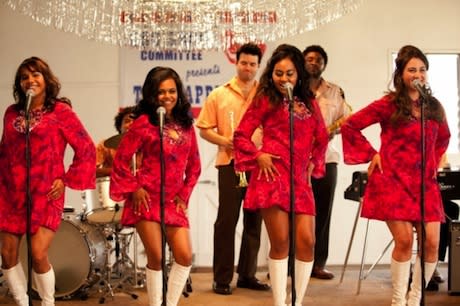Truth isn't as dramatically convenient as fiction. Aiming for a broadly inspirational crowd-pleaser, Tony Briggs (who wrote the stage play and co-wrote the screenplay) moulded his mother and aunt's experiences as backup singers for a soul-influenced Maori band performing for American troops in Vietnam into something more closely resembling a family-oriented Dreamgirls.
The racial politics of Australia in the late '60s feature prominently in this otherwise light-hearted story of four young aboriginal women with velvet voices who take a shot at the big leagues with the help of an alcoholic Irish never-was. Deborah Mailman, who played a different character in the stage version, R&B singer Jessica Mauboy and the relatively inexperienced Mirana Tapsell and Shari Sebbens star as the three sisters and their estranged cousin that make up the unlikely singing sensation.
Each member of the native Australian foursome is well-suited to her respective role: as momma bear/eldest sister Gail, screen veteran Mailman is required to do all the heavy lifting; Mauboy has the golden throat necessary to be convincing as cocky leader singer Julie; Tapsell relishes the opportunity to play enthusiastic flirt Cynthia; and not much is needed from Sebbens' Kaye, save her pale completion, which is taken care of by genetics.
That Kaye isn't "black enough" is a major point of contention between her and her cousins, particularly Gail, and while that conflict provides most of the story's dramatic tension, it's strange that nobody ever suggests that her milk chocolate skin tone has anything to do with her obviously being of biracial descent. Her mother is clearly white, so why beat around the bushman?
While Briggs's intentions are sound, the race-relations angle feels a bit forced and isn't what makes The Sapphires work better than it has any right to for such a paint-by-numbers, feel-good dramatic comedy. All of the young women are enjoyably sassy and their blatantly dubbed four-part harmonies (at least Mauboy provides her own singing, but fails to sell it as well on screen when she's faking it) sound absolutely divine.
The film's secret weapon, however, is Chris O'Dowd, as the group's manager, Dave Lovelace. He's by no means a versatile actor, but damn does that charming fool have presence.
If you're willing to overlook some heavy-duty contrivances and give yourself over to the gut-busting beauty of sweet soul music and the simple pleasures of on-screen chemistry, The Sapphires sparkles with unassuming joy.
(eOne)The racial politics of Australia in the late '60s feature prominently in this otherwise light-hearted story of four young aboriginal women with velvet voices who take a shot at the big leagues with the help of an alcoholic Irish never-was. Deborah Mailman, who played a different character in the stage version, R&B singer Jessica Mauboy and the relatively inexperienced Mirana Tapsell and Shari Sebbens star as the three sisters and their estranged cousin that make up the unlikely singing sensation.
Each member of the native Australian foursome is well-suited to her respective role: as momma bear/eldest sister Gail, screen veteran Mailman is required to do all the heavy lifting; Mauboy has the golden throat necessary to be convincing as cocky leader singer Julie; Tapsell relishes the opportunity to play enthusiastic flirt Cynthia; and not much is needed from Sebbens' Kaye, save her pale completion, which is taken care of by genetics.
That Kaye isn't "black enough" is a major point of contention between her and her cousins, particularly Gail, and while that conflict provides most of the story's dramatic tension, it's strange that nobody ever suggests that her milk chocolate skin tone has anything to do with her obviously being of biracial descent. Her mother is clearly white, so why beat around the bushman?
While Briggs's intentions are sound, the race-relations angle feels a bit forced and isn't what makes The Sapphires work better than it has any right to for such a paint-by-numbers, feel-good dramatic comedy. All of the young women are enjoyably sassy and their blatantly dubbed four-part harmonies (at least Mauboy provides her own singing, but fails to sell it as well on screen when she's faking it) sound absolutely divine.
The film's secret weapon, however, is Chris O'Dowd, as the group's manager, Dave Lovelace. He's by no means a versatile actor, but damn does that charming fool have presence.
If you're willing to overlook some heavy-duty contrivances and give yourself over to the gut-busting beauty of sweet soul music and the simple pleasures of on-screen chemistry, The Sapphires sparkles with unassuming joy.
